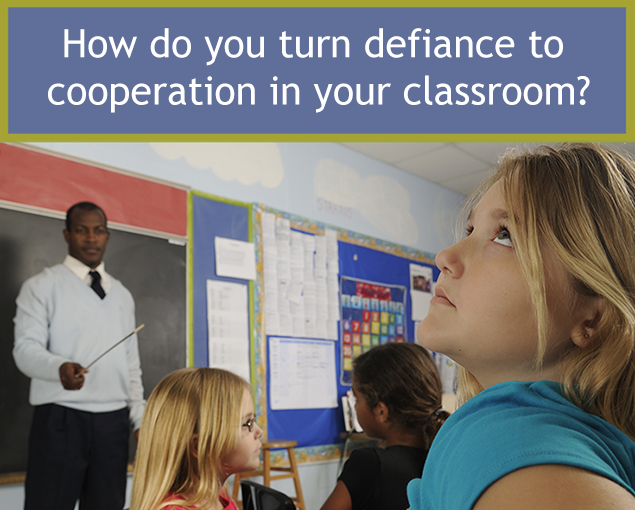How Can Teachers Positively Tackle Defiant Students?
Posted by Network Support · Leave a Comment
Beyond Defiance
When students are defiant, their goal is not to disrespect teachers. Rather, it’s to feel significant…
Students who are defiant or non-compliant can be among the most challenging to teach. They can frequently interrupt instruction, often do perform poorly academically, and may show little motivation to learn.
The ultimate goal of any disciplinary measure is to teach the student more positive ways of behaving and give them personal power. Thus, the more you proactively give students constructive ways to experience personal power, the more cooperative they’ll be. Here are some techniques, based on research, that tend to work best.
1. Positive Teacher Recognition
Even actions as simple as greeting the student daily at the classroom door or stopping by the student’s desk to ask “How are you doing?” can over time turn strained relationships into positive ones. Monitor the classroom frequently and intervene proactively to redirect students before any mild misbehaviors escalate into more serious problems. Avoid saying or doing things that are likely to anger or set off a student. Speak calmly and respectfully, rather than raising your voice. Do not use sarcasm.
2. Praise
Give praise that is specific and does not embarrass the student. Defiant students can respond well to adult praise only when it is sincere and specific, and is not embarrassing. Ideally, the teacher should deliver praise as soon as possible after the positive behavior. Further, praise should be descriptive. Vague, general praise can sound fake and does not give the student any useful information about how their behavior meets or exceeds the teacher’s expectations.
3. Pay Attention
The teacher may be able to “interrupt” a student’s escalating behaviors by redirecting that student’s attention or temporarily removing the student from the setting. If the student is showing only low-level defiant or non-compliant behavior, you might try engaging the student in a high-interest activity such as playing an educational computer game or acting as a classroom helper. Or you may want to briefly remove the student from the room (‘antiseptic bounce’) to prevent the student’s behavior from escalating into a full-fledged confrontation.
4. Participation
Have the student participate in creating a behavior plan. Students feel a greater sense of ownership in their behavior choices when active contributors to determining outcomes. As with all of us, students also tend to know themselves best: what triggers will set off their problem behaviors; what strategies they find most effective in calming; and how best they avoid conflicts or other behavioral problems. The development and use of an individualized learning plan that includes behavior management might be useful in getting and keeping students on track.
5. Soft Reprimands
Use soft reprimands to give a brief, gentle signal to direct back to task any student who is just beginning to show signs of misbehavior or non-compliance. These soft reprimands can be verbal (a quiet word to the student) or non-verbal (a significant look). If a soft reprimand is not sufficient to curb the student’s behaviors, the teacher may pull the student aside for a private problem-solving conversation or implement appropriate disciplinary consequences.
6. Emotion Labeling
When the teacher observes that a student seems angry or upset, the instructor labels the emotion that seems to be driving that student’s behavior. Emotion labeling can be a helpful tactic in de-escalating classroom confrontations because it prompts the student to acknowledge their current feeling-state directly rather than continuing to communicate it indirectly through acting-out behavior. Once a powerful emotion such as anger is labeled, the teacher and student can then talk about it, figure out what may have triggered it and jointly find solutions that will mitigate it.
Like this article for teachers?
Browse the Professional Learning Board COURSE CATALOG to find related online courses for teachers in your state. Professional Learning Board is a leading provider of online professional development classes that teachers use to renew a teaching license or renew a teaching certificate.





